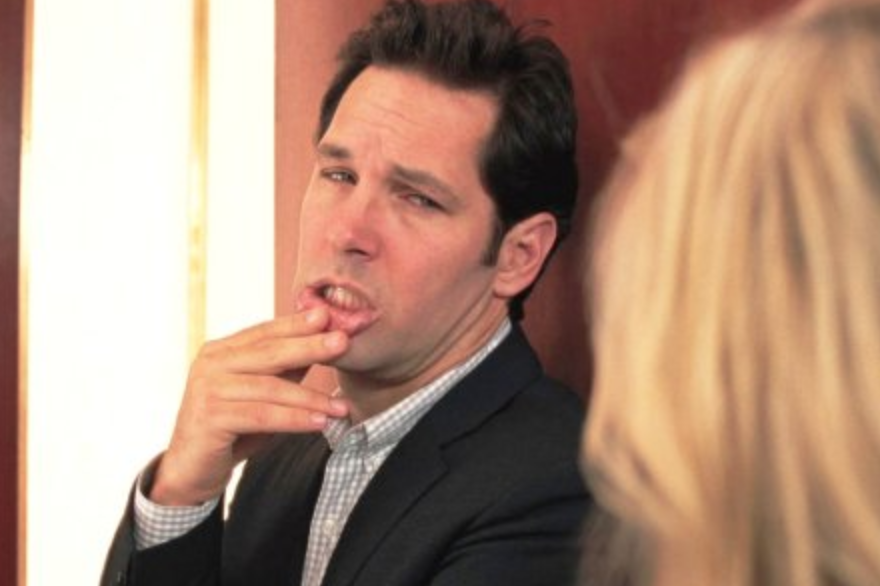“We’re all just one small adjustment away from making our lives work.” These are the kind and assuring words of the ultimate typecast “nice guy,” Paul Rudd, as George Madison in James L. Brooks’ How Do You Know. And as he tells them to recently rejected from national women’s softball league Team USA Lisa Jorgenson (Reese Witherspoon, joining Rudd onscreen for the third time), it’s clear that he is being carefully puppeteered by James L. Brooks, the longtime proponent for this underdog romantic male interest.
Apart from maybe the now essentially blacklisted Woody Allen, Brooks has, in fact, been one of the only spokesmen for the nice guy in a way that isn’t grating in the same vein as Judd Apatow (because, in truth, no woman makes the concession to a Seth Rogen-type unless he’s as rich as Seth Rogen). Starting with Broadcast News in 1987 (because Brooks’ writing and directorial debut, Terms of Endearment, was all about being a viable film for every Mother’s Day to come), Brooks’ oeuvre of six tautly executed films under the moniker of writer-director began to veer toward the favoring of the neurotic, needy and pathetic male. But in a way that made this personality seem far more appealing for a woman than the confident, winsome archetype. The jock, to put it more bluntly. In How Do You Know, Owen Wilson’s Matty Reynolds is just that: the jock major league baseball player who thinks Lisa being a “jock girl” is what makes her good in bed. He’s just that brain dead and tone deaf to sensitivity. But lovable brain dead and tone deaf to sensitivity as only Owen Wilson can convey. To this point, Brooks has always been deft when it comes to casting his male leads. That Rudd and Wilson are modern reprisals of Albert Brooks as Aaron Altman and William Hurt as Tom Grunick in Broadcast News only adds to Brooks’ ceaseless commitment to championing the “beta male” even at a time when such a character has already oversaturated the culture to the point of leaving women with nothing more than puddles of emotion on the floor with a flaccid penis sticking out of it as an option for a romantic “partner.”
That being said, George is going through it, to say the least, right around the time he first “meets” Lisa, or rather, calls her on the phone to tell her that he actually can’t go through with the blind date he promised his friend he would if she was in fact expecting a call from him. To hear this after getting pummeled by a baseball just to pick up her phone only adds to the bizarreness that she now associates with George. But this strange embarrassment is to become the least of George’s worries. To boot, his father, Charles (Jack Nicholson, another of Brooks’ go-to males), isn’t exactly a beacon of light to turn to upon George learning that he is being indicted for “corporate malfeasance,” as it is abstractly called. Except that George has no knowledge of any wrongdoing on the part of the company, which eventually leads him to the conclusion that it must be his father’s handiwork. But that’s all part and parcel of being the “nice guy”–even your own father wants you to take the fall.
But in Lisa, George has found strength he never knew–and it’s a strength that is best summed up in the hospital room where his secretary, Annie (Kathryn Hahn), has just given birth and the father of her child, Al (Lenny Venito), comments, “If you guys wound up with someone who thought that your worrying was uh… you know, neurotic. You know, somebody who didn’t get you…who wanted you to feel bad about yourself, wanted to make you be more normal of a person, or wanted you to change. You know…who didn’t love all of you. Who didn’t want to leave great enough alone. And… I thought that I could do that for you. That could be a legitimate, um, function for me in your life.” This, too, is what George wants to be for Lisa, who herself confessed to George that she never felt that thing women are supposed to feel about getting married and having kids–which is to say making it the end all, be all of her goals in life. Still, there is Matty to consider. For even meatheads have feelings. Even if they forget what they are after about five seconds.
In any event, Brooks’ film releases in this writer-director capacity are rare. Despite this, he finds ways to dip his hand into the cultural lexicon of nice guy appreciation by producing throughout his “reprieves” (some films that fit the bill include Big, Say Anything…, Jerry Maguire [Jerry eventually turned out to be a nice guy], Riding in Cars With Boys and The Edge of Seventeen [these latter two being examples of female leads with nice guy qualities]). After 2004’s Spanglish–another nice guy-touting film with Adam Sandler in the lead–it took six years for him to give us How Do You Know. We’re now eight years on and still nothing new from Brooks, perhaps unspokenly retired in this capacity–or perhaps he just feels he’s advocated all he can for this ilk of male. And has seen that, clearly, it hasn’t made much of an imprint when considering that nice guys still very much finish last–as indicated by the current leader of the free world.



















